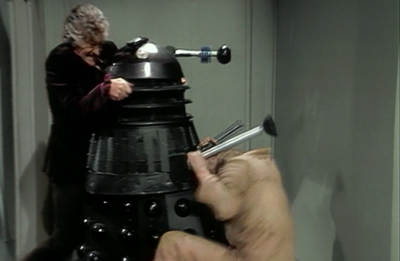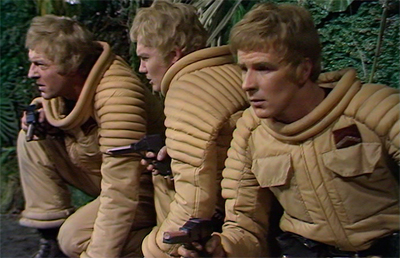To celebrate the fiftieth anniversary of the longest-running science-fiction show in the world, I’ll be taking weekly looks at some of my own personal favourite stories and arcs, from the old and new series, with a view to encapsulating the sublime, the clever and the fiendishly odd of the BBC’s Doctor Who.
Planet of the Daleks originally aired in 1973.
You know, for a man who abhors violence, I must say I took great satisfaction in doing that.
– The Doctor on demolishing a Dalek
The combined Frontier in Space and Planet of the Daleks serials were intended to mark the tenth anniversary of Doctor Who with a twelve-part epic that could be measured against the lost Daleks’ Master Plan. I’m quite fond of The Frontier in Space, and I’d argue that it stands as the best space-opera of the Pertwee era, but I’ll concede that the story is severely weakened by the links it shares with this little adventure, which is conclusive proof that Daleks were quite stale long before Davros was invented.
It feels a little strange, because the ending of The Frontier in Space is cut so abruptly into this serial, but there’s little acknowledgment of the previous serial over the course of this adventure. Sure, we begin with the Doctor incapacitated by a laser blast to the head, but beyond that there’s only a line or two of dialogue here or there mentioning the fact that the Daleks had been planning to set the two largest interstellar empires against one another and pick up the pieces. There are no returning guest stars from the previous serial, and no real resolution to the conflict brewing between Earth and Draconia. Basically, while The Frontier in Space feeds directly into this adventure, Terry Nation’s script seems to barely acknowledge it.
It’s particularly frustrating because Nation’s story is rather obviously padded and extended well past the length that the plot requires. Perhaps the most frustrating aspect of all this is the way that the first episode treats the presence of the Daleks as a surprise, especially given (a.) the serial is called Planet of the Daleks and (b.) the last adventure ended with the Doctor imploring the Time Lords for help. So it’s no surprise when the Doctor spraypaints an invisible enemy to discover it’s a Dalek, and yet Pertwee’s Doctor recoils in horror, “Daleks!”
It doesn’t help that Nation clutters the serial with a variety of elements that serve only to distract from the central narrative. For the first time, as an “automatic oxygen supply exhausted” error message flashes on the screen, we discover the TARDIS as an internal oxygen supply, like some sort of time submarine. It’s a cheap ploy used to create dramatic tension and delay the introduction of the Daleks, which seems kinda pointless since we know that they’re here.
It’s a shame, because one gets the sense that Spiradon might have made for an interesting little planet in other circumstances. It’s “one of the nastiest pieces of space garbage in the ninth system” and home to “vegetation that’s more like animal life than plant, creatures hostile to everything including themselves and a climate that changes from tropical in the day to sub-freezing in the night.” The Doctor remarks, “You know, this planet never ceases to amaze me. First we find a gigantic refrigerator and now night storage heaters. It really sounds quite luxurious.” It might be interesting, if it wasn’t treated a means to distract the audience from the fact that relatively little is happening.
The jungle set looks cheap and tacky, in the worst possible way, but I don’t really mind that, to be honest. After all, this is the year that gave us Carnival of Monsters, an adventure that seemed to be built around acknowledging how tacky the show would make alien worlds look – there’s an air of pantomime about it. However, the planet never takes on any real identity, and feels more like spherical collection of plot devices designed to distract attention away from the Daleks – and given that the whole point of the story is the Daleks, that does seem a bit pointless.
So we get strange bits like the invisible Dalek patrols from the first episode, that are never heard from again, and only mentioned in passing in the dialogue. It seemed like the Daleks had done a relatively decent job with invisibility, so it seems strange that they appear to have stopped worrying about it after the first episode is over. Throughout the serial, the Daleks are made to look like quite the fools, and the cast seem to jump on and wrestle them with impunity, hardly creating the notion that these creatures are to be feared. In fact, as the Doctor hauls one into the planet’s “ice volcano”, its helpless cries of “assist! assist!”make it sound quite pitiable and victimised. I actually felt a pang of sympathy for the poor creature.
The entire adventure seems to have been structured as some sort of “Daleks’ Greatest Hits.” It was once pithily remarked that Terry Nation only really had one Dalek script that he kept submitting to the show. I’m not sure if that’s fair, but the genocidal aliens seem to be going through the motions here. So we get moments like the Daleks planning to release a biological weapon, or forcing the local population into slavery. We get a reprise of the romance from The Dalek Invasion of Earth with Jo falling awkwardly in love with one of the resistance (“you see, I’ve found a reason to be more careful, a reason for wanting to stay alive”) and the Thals feature for the first time since The Daleks (or The Mutants, depending on who you ask).
The problem is that none of this is executed with any particular enthusiasm or energy. There’s no vitality to the adventure at all, no sense of fun. Pertwee reportedly hated the Daleks, and he seems to spend most of the serial on autopilot. Tom Baker responded to bad scripts by turning it up to eleven, and Peter Davison preferred to underplay it, but Pertwee just doesn’t really try it. When the Daleks have him trapped in a lift, he offers a rather blaisé, “Let’s try another level.” On finding a few Thals trapped beside an air vent, he remarks, “I know it’s not the moment to ask how you got in there, but I’d be fascinated to know how.” The problem is that Pertwee actually seems he’d be more interested in hearing thatstory than he would in continuing on with this one.
On the other hand, there are some nice moments around the Daleks. The problem is that they’re mostly confined to dialogue. Recalling their origins as Nazi analogues, there’s something chilling about how they took control of the planet using “the usual Dalek technique of rule by terror” – which consists of “mass exterminations followed by absolute suppression of the survivors.” Wester recalls, “Before the Daleks invaded, they bombarded the planet with bacteria. Only a handful of my people survived.” The problem is that none of this large-scale evil can be found within the story itself. Barring the rather wonderful way that the Daleks refer to their Thal cousins as “aliens” (because despite sharing the same planet, everything not Dalek is considered alien), there’s really not a lot here.
It doesn’t help that the serial’s production values can’t successfully realise what the Doctor describes as “the greatest Dalek invasion force ever assembled!” It’s very clearly an insert shot of little models, with no real effort made to give the story a sense of scale. It’s easy enough to ignore some of the other special effects failures (including dodgy CSO and the purple pimp-coats for the invisible inhabitants of Spiradon), but that’s one element of the adventure that really doesn’t work with the effects used.
As an aside, I do wonder why the destruction of the Thal spaceship (and the capture of the Dalek one) is such a big deal. I know that they were stranded on the planet, but surely the Doctor could have dropped them home in his TARDIS? Surely they were smart enough to realise that he had landed on the planet in a space ship and could figure out that he could take them home again? I really hope the Thal people weren’t resting their hopes on a team too stupid to work even that basic fact out.
There are other problems with Nation’s script. He seems to forget at points (like he would in Destiny of the Daleks) that his creations aren’t robots. There are times when he’s clear on that fact (as the Doctor and Thals seem to scoop the mutants out of their shells), but there are times when he doesn’t seem so sure. “Good, because the business of command is not for a machine, is it?” the Doctor advises the Thal commander. “The moment that we forget that we’re dealing with people, then we’re no better off than the machines that we came here to destroy. When we start acting and thinking like the Daleks, Taron, the battle is lost.”Maybe he was talking metaphors… but it still feels a little awkward.
As does Nation’s ham-fisted edu-tainment nonsense. The Doctor uses the scientific principle that hot air rises in order to escape the Daleks at one point, in a sequence that my secondary school physics leads me to question. What’s the point in teaching kids science in a way that doesn’t work in a show about time travel? More than that, though, there’s the cringe-worthy observations from the Doctor warning the Thals not to glorify warfare. “So be careful how you tell that story, will you?” he asks. “Don’t glamorise it. Don’t make war sound like an exciting and thrilling game.”
To be frank, it seems just a little bit hypocritical in the wake of a six-part serial that tried really hard to make the Doctor’s campaign seem like a fun little adventure. The statement might carry a bit of weight if Planet of the Daleksadopted a sombre tome, but it seems to ask us to cheer on our heroes as they vanquish the foul Daleks, rather than dwelling on the cost. It’s like Nation reached the end and suddenly realised that he needed to stick an anti-war message in there.
Planet of the Daleks is a mess and a waste of the Doctor’s most iconic foes. In fairness, the first episode had me worrying – after all, the Doctor takes the time to change from a green dandy outfit to a purple dandy outfit in the middle of what seems to be a galactic crisis. It’s an illustration of the Daleks can’t really support a serial on their own, but they need another interesting angle in order to make them work – the planet of Spiradon doesn’t complement them well enough. It’s a shame, because Planet of the Daleks could very easily have been something special. Instead, it ends up a massive disappointment.
You might be interested in our reviews of the tenth season of the classic television show:
- The Three Doctors
- Carnival of Monsters
- Frontier in Space
- Planet of the Daleks
- The Green Death
Filed under: Television | Tagged: bbc, Carnival of Monsters, Dalek, Dalek Invasion of Earth, Davros, doctor, DoctorWho, Frontier in Space, Jo Grant, Planet of the Daleks, Skaro, tardis, Terry Nation, Time Lord, timelords |




























Reblogged this on Wahlen 2013 – Wer das Volk quält, wird nicht gewählt!.